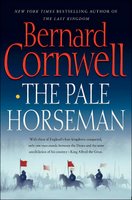 The Pale Horseman
The Pale HorsemanBernard Cornwell
349 pages
HarperCollins, 2006
This is the follow-up volume to Cornwell’s “The Last Kingdom” and a continuation of the story of Alfred the Great as told through the eyes of Uhtred. This novel covers the events of 877 and 878, two critical years for the kingdom of Wessex and the eventual rise of England as a united kingdom. After defeating the Danes and forcing them to the negotiating table Alfred hoped Wessex was secure against further Viking depredations from his north and east, however his hope was short-lived as in January of 878 the Danes under Guthrum fell on his winter court at Chippenham and broke his power. Alfred retreated to the marshes around Athelney with his family and a handful of loyal retainers. Here in the swamps he slowly regained his hope and began to reassert his power as king of the West Saxons (from whence the term Wessex comes.) Finally sometime after Easter he moves from the swamps to meet the Danish army in open battle at the Battle of Edington which turned out to be a decisive victory for Alfred’s smaller army.
I am amazed when I realize how short of a time the events of the book covered. I realize this sounds like Cornwell drags thing out, but it is more a function of how much happened in the critical months covered by the novel. As in the first novel in this series Cornwell gives us a protagonist who is difficult to like at times without engaging in a little cultural relativism, however this makes the novel feel a bit more real and enhances the alien feeing of that bygone era when men were men, women were women, and sheep were afraid. As I was reading the parts about Alfred’s travails in the marshes I could not help but begin drawing parallels between these stories and the story of Robert the Bruce. I do not know if this is true or apocryphal however I have read in a couple of places how after his defeat at the hands of the Comyns and the incarceration of his family he retreated to a cave. He was in particularly low spirits but as he sat in the cave he watched a spider spin a web. The spider would fail and immediately turn around and try again. The spider would fail again and, undaunted, begin to spin again. This sequence of events repeated several times before the spider finally completed its web. Watching the little creature renewed Robert’s determination and he left the cave and began to rally his supporters, eventually winning Scotland’s freedom from the English at the Battle of Bannockburn. Just an interesting parallel of dark times for two kings who managed to, against all odds, return from a devastating defeat to eventually win their kindgom’s freedom.
It should come as no surprise to you guys that I really, really enjoyed this book. The historical aspect is right up my alley and it manages to echo some of the great medieval romance stories without being schmaltzy and unrealistic. If historical fiction is your thing, then I cannot recommend this book enough and I can’t wait for the sequel “The Lords of the North” so much so that I am considering ordering it from Amazon UK since it comes out in the UK in June, three months before it will come out here.
Next Up: Misquoting Jesus by Bart D. Erhman

No comments:
Post a Comment